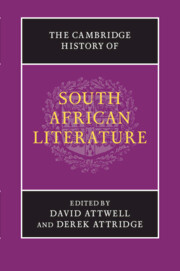Book contents
- Frontmatter
- Introduction
- PART I ORATURES, ORAL HISTORIES, ORIGINS
- 1 ‘The Bushmen's Letters’: |Xam narratives of the Bleek and Lloyd Collection and their afterlives
- 2 A contextual analysis of Xhosa iimbongi and their izibongo
- 3 ‘I sing of the woes of my travels’: the lifela of Lesotho
- 4 Praise, politics, performance: from Zulu izibongo to the Zionists
- 5 IsiNdebele, siSwati, Northern Sotho, Tshivenda and Xitsonga oral culture
- PART II EXPLORATION, EARLY MODERNITY AND ENLIGHTENMENT AT THE CAPE, 1488–1820
- PART III EMPIRE, RESISTANCE AND NATIONAL BEGINNINGS, 1820–1910
- PART IV MODERNISM AND TRANSNATIONAL CULTURE, 1910–1948
- PART V APARTHEID AND ITS AFTERMATH, 1948 TO THE PRESENT
- PART VI SOUTH AFRICAN LITERATURE: CONTINUITIES AND CONTRASTS
- Index
- References
3 - ‘I sing of the woes of my travels’: the lifela of Lesotho
from PART I - ORATURES, ORAL HISTORIES, ORIGINS
Published online by Cambridge University Press: 28 January 2012
- Frontmatter
- Introduction
- PART I ORATURES, ORAL HISTORIES, ORIGINS
- 1 ‘The Bushmen's Letters’: |Xam narratives of the Bleek and Lloyd Collection and their afterlives
- 2 A contextual analysis of Xhosa iimbongi and their izibongo
- 3 ‘I sing of the woes of my travels’: the lifela of Lesotho
- 4 Praise, politics, performance: from Zulu izibongo to the Zionists
- 5 IsiNdebele, siSwati, Northern Sotho, Tshivenda and Xitsonga oral culture
- PART II EXPLORATION, EARLY MODERNITY AND ENLIGHTENMENT AT THE CAPE, 1488–1820
- PART III EMPIRE, RESISTANCE AND NATIONAL BEGINNINGS, 1820–1910
- PART IV MODERNISM AND TRANSNATIONAL CULTURE, 1910–1948
- PART V APARTHEID AND ITS AFTERMATH, 1948 TO THE PRESENT
- PART VI SOUTH AFRICAN LITERATURE: CONTINUITIES AND CONTRASTS
- Index
- References
Summary
Sotho folk literature, like that of other Bantu or indigenous languages spoken in South Africa, has been in existence since time immemorial, and has been passed by word of mouth from one generation to the succeeding, until in the latter half of the nineteenth century when it was transcribed by the Paris Evangelical Missionary Society, whose members arrived in Lesotho around 1833. Poetry in particular is a salient genre of this folk tradition. The literature in general is composed of a variety of genres, namely myths and legends (ditshomo), riddles (dilotho), proverbs and idioms (maele le maelana), folk-songs (dipina), hymns (dikoma), praises (dithoko) (Guma, Likoma and Form, Content and Technique), and through evolution to modern poetry (dithothokiso). Dikoma and dithoko are predominant forms of Sotho literature and perhaps the oldest recognisable form of poetry. However, they are not sui generis, as they are also found in the oral tradition of other languages, for example isiZulu and isiXhosa, as discussed in Chapters 2 and 4 of this volume.
The word dithoko (singular: thoko) is derived from the verbal root, ho roka (to praise). Later I shall illustrate how dikoma and dithoko, the oldest forms of poetry, have resonance in a later form of poetry that gained the somewhat curious term of difelats a ditsamaya naha (also written as lifela tsa litsamaea naha in the orthography of Lesotho), which literally means ‘songs of veteran travellers’. The singular of difela is sefela, which literally translates as ‘hymn’ in modern Sesotho.
- Type
- Chapter
- Information
- The Cambridge History of South African Literature , pp. 60 - 76Publisher: Cambridge University PressPrint publication year: 2012
References
- 1
- Cited by

